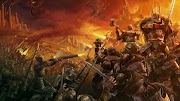Technobabylon: The girl with the jargon tattoo
Why is the future never happy? When was the last time the latter half of the 21st century was depicted as a genuinely nice place to be? Well, in keeping with tradition, the 2087 dystopia of pixelated adventure Technobabylon, from the publisher of Gemini Rue, is certainly no picnic.
In this suitably depressing future, genetic engineering is part of the day to day, omnipresent AI are in charge, and there’s an addictive online world known as the Trance where one of the three main characters, Latha, spends all of her time. That doesn’t sound anything like our Buzzfeed habits… “A lot of sci-fi and speculative fiction comes from the idea of taking a particular concept and seeing what happens if one runs too far with it,” explains game designer James Dearden. “Of course, often the results are negative, but in Technobabylon I’m hoping to convey the message that the technology in itself isn’t inherently harmful, but that the harm derives from the people using it. Whether it’s addicts over-extending themselves, or criminals taking advantage of those within it, the Trance itself is a morally neutral medium of communication, much as the internet is today.”
Trance Nation
Jumping between the lives of three interlinked characters a virtual addict, a secret police member, and a case officer Technobabylon’s plot looks intriguing and dark with a strong focus on each individual’s story. “The benefit with using three characters is that you can almost make several different games out of it,” says Dearden. “Though the player is ultimately the one driving the story, each lead is getting themselves into a different situation with its own obstacles, and has different ways of overcoming them. For example Latha, a virtual-reality addict who has essentially grown up in the internet, is more comfortable with misbehaviour. Regis and Lao, as police investigators, have to be a bit more careful about how they work, and are more aware of the potential weight of their actions.”
We’ve been overloading on pixels recently, but Technobabylon has a grim and melancholy detailed style that’s a far cry from anything you could call spritely. “We’ve drawn upon a lot of different artistic sources for inspiration in an effort to make it evocative of proper cyberpunk,” Dearden explains. “When playing it, people might guess that I’ve played through Deus Ex a few too many times, and that Ghost In The Shell is one of my absolute favourites; worlds where it always seems to be night-time, and there’s the sense that everything you do is being watched. Even with the style itself, we hope to evoke an era. Pixel art isn’t just a symptom of the limitation of indie games’ budgets in this case, it helps to create the mood!”
In this suitably depressing future, genetic engineering is part of the day to day, omnipresent AI are in charge, and there’s an addictive online world known as the Trance where one of the three main characters, Latha, spends all of her time. That doesn’t sound anything like our Buzzfeed habits… “A lot of sci-fi and speculative fiction comes from the idea of taking a particular concept and seeing what happens if one runs too far with it,” explains game designer James Dearden. “Of course, often the results are negative, but in Technobabylon I’m hoping to convey the message that the technology in itself isn’t inherently harmful, but that the harm derives from the people using it. Whether it’s addicts over-extending themselves, or criminals taking advantage of those within it, the Trance itself is a morally neutral medium of communication, much as the internet is today.”
Trance Nation
Jumping between the lives of three interlinked characters a virtual addict, a secret police member, and a case officer Technobabylon’s plot looks intriguing and dark with a strong focus on each individual’s story. “The benefit with using three characters is that you can almost make several different games out of it,” says Dearden. “Though the player is ultimately the one driving the story, each lead is getting themselves into a different situation with its own obstacles, and has different ways of overcoming them. For example Latha, a virtual-reality addict who has essentially grown up in the internet, is more comfortable with misbehaviour. Regis and Lao, as police investigators, have to be a bit more careful about how they work, and are more aware of the potential weight of their actions.”
We’ve been overloading on pixels recently, but Technobabylon has a grim and melancholy detailed style that’s a far cry from anything you could call spritely. “We’ve drawn upon a lot of different artistic sources for inspiration in an effort to make it evocative of proper cyberpunk,” Dearden explains. “When playing it, people might guess that I’ve played through Deus Ex a few too many times, and that Ghost In The Shell is one of my absolute favourites; worlds where it always seems to be night-time, and there’s the sense that everything you do is being watched. Even with the style itself, we hope to evoke an era. Pixel art isn’t just a symptom of the limitation of indie games’ budgets in this case, it helps to create the mood!”





0 Comments